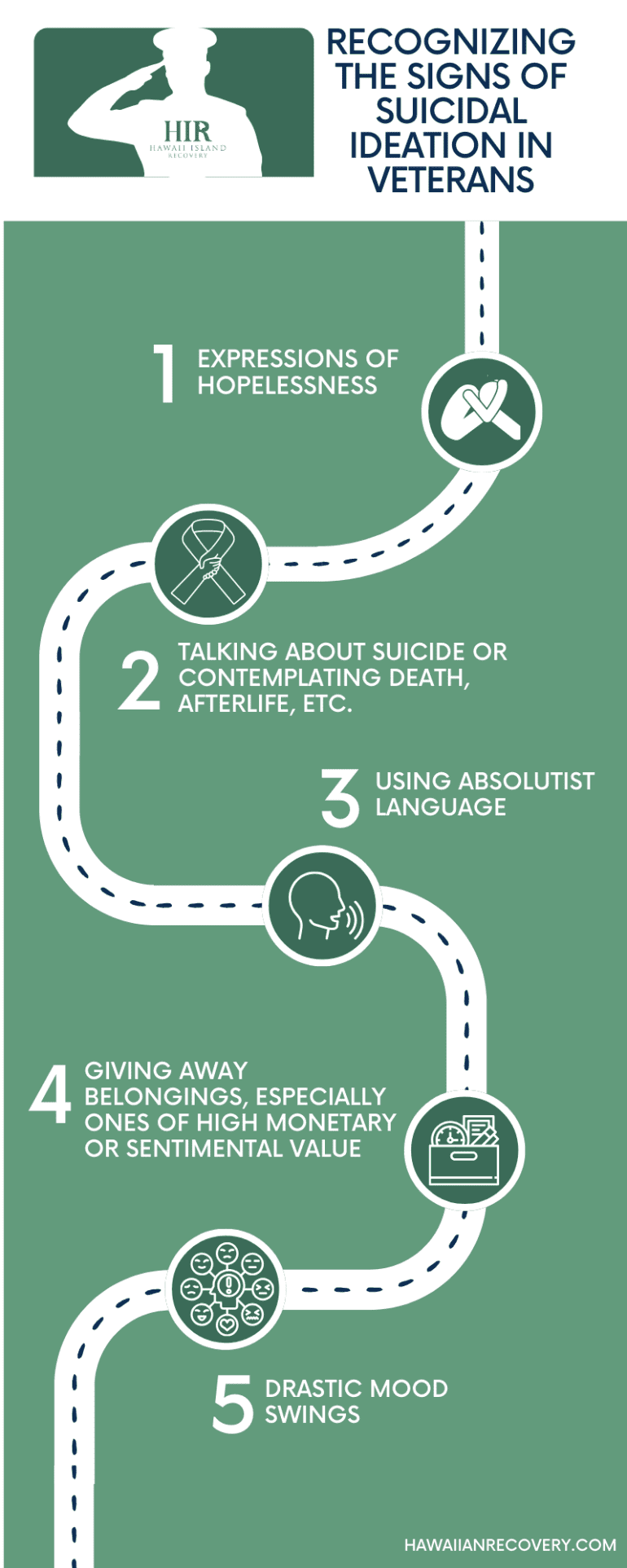Veterans put both their bodies and minds on the line responding to the call of duty. From navigating life-threatening situations and active warzones to emotional traumas on base, veterans overcome a myriad of challenges every day. However, even after being successfully discharged from service and transitioning to civilian life, many veterans will continue to face these challenges. Between the prevalence of addiction among veterans to the continued effects of trauma, PTSD, survivor’s guilt, and more, professional treatment for addressing veteran needs is paramount. Continuing to stigmatize or avoid such challenges can have destructive consequences, the most devastating of which is veteran suicide.
The Prevalence of Veteran Suicide in the United States
Veterans must overcome a deluge of challenges in their transition to civilian life. However, with all of the challenges that veterans must face, suicidal ideation can be common and dangerous for veterans and their families. In the United States, veterans are about 1.57 to 1.66 times more likely to die by suicide. Families looking to support veteran loved ones as they overcome addiction, trauma, and more can feel overwhelmed in finding the best route to support veteran loved ones. Hawaii Island Recovery can empower military families and loved ones to best identify and prevent suicide in veteran loved ones.
Recognizing the Signs of Suicidal Ideation in Veterans
Noticing key signs of veteran suicide is the first step in taking action to prevent the most tragic possible outcome. Some of the most common signs that veterans may be having suicidal thoughts include:
- Expressions of hopelessness
- Talking about suicide or contemplating death, afterlife, etc.
- Using absolutist language
- Giving away belongings, especially ones of high monetary or sentimental value
- Neglect of personal needs or hygiene
- Engaging in self-harm
- Increase in risk-taking behaviors or neglect of personal well-being or safety
- Drastic mood swings

However, there may be additional signs depending on each veteran. Working with the professionals at Hawaii Island Recovery can help each person take a personalized approach to addressing potential suicidal ideation in their veteran loved ones.

Celebrating Veteran's Day is an important time. Veteran's Day can be difficult for many, and knowing how to celebrate and acknowledge the stresses can be the best approach to a truly fulfilling and meaningful holiday for veterans. For more information on how our luxury rehab in Hawaii can help, call to speak to us today at (866) 390-5070.
More infoTaking Action to Prevent Veteran Suicide
Veteran suicide is both devastating and all too common, and loved ones of veterans and military families can all take action to help prevent veteran suicide. While each situation is unique, erring on the side of caution, establishing preventative measures, and working with Hawaii Island Recovery’s dedicated veteran support staff can all help to take a proactive stance in preventing veteran suicide.
Lock up Firearms
Many veterans keep firearms in their homes following their time in service. Between their hands-on training and the feeling of safety that many veterans feel with them, they can be a common part of civilian life. However, it is essential to keep firearms locked up or to keep the weapon and ammunition stored in different places behind their own individual locks. This kind of measure can prevent veteran suicide by forcing veterans to take a few extra minutes to consider the consequences of their actions before taking any decisive action, which can make all the difference when it comes to veteran suicide.
Create a Communication Strategy
Establishing a safe space for veterans is crucial. This also involves engaging in effective, non-stigmatizing language, and actively listening to what veterans say. However, this kind of open communication and trust takes time to develop. Talking about hobbies and interests and expressing sympathy before jumping into other heavier topics may be necessary to establish a supportive, honest, and destigmatized home atmosphere where veteran loved ones feel empowered and safe in expressing personal needs, challenges, and more.

Overcoming addiction as a veteran is difficult, and having established, effective, and comprehensive relapse prevention strategies in veteran life is crucial to avoid re-engaging with drugs or alcohol. For more information on our dedicated veteran programs and unique approach to our Hawaii rehabilitation, or if you have any questions about your next step, call (866) 390-5070.
More infoDevelop a Crisis Plan
Having a dedicated plan in case a veteran loved one does express signs of veteran suicide or a drastic increase in such thoughts can be crucial to enacting support quickly and efficiently. A list of phone numbers, crisis support lines, loved ones, and professional treatment facilities like Hawaii Island Recovery can all help to create a plan, providing a prepared plan to tackle any challenges that may arise.
Maintain Check-Ins
Keeping a regular schedule and checking in with veteran loved ones can also help to prevent veteran suicide. For some, this can be through identifying any developing signs of veteran suicide early, while others may be able to further develop feelings of trust and openness during this time. This can also take many forms, from regular mealtimes together or weekly meet-ups to even daily phone calls, emails, and more. Having any kind of consistent way to communicate can be essential for identifying any changes in language or behaviors that may indicate the possibility of suicidal ideation.
Avoid Substance Use
Addictive substances can further feelings of depression, anxiety, guilt, trauma, and more in a veteran’s life. Addressing the use of drugs or alcohol and working with veterans to embrace abstinence, especially while continuing to cope with continued mental health disorders or trauma, is paramount.
Hawaii Island’s Role in Preventing Veteran Suicide
Veteran suicide is devastating. A dedicated veteran treatment program, coupled with familial support and education, can provide the best approach to healing and support for veterans and their families. Hawaii Island Recovery’s treatment centers in Hawaii are dedicated to such holistic healing and can be a transformative approach to preventing veteran suicide through finding the most effective treatment options for a healthy and fulfilling veteran life.

Suicide among veterans is all too common and tragic, and knowing how to prevent veteran suicide is instrumental in keeping veteran loved ones safe. At Hawaii Island Recovery, we understand the challenges that veterans and their families face every day, and we are committed to creating a place of healing and camaraderie to address suicidal ideation, addiction, trauma, and more among veterans of any branch of the armed forces. Our veteran-specific treatment programs are curated to combine trauma-informed treatment and holistic options for veterans throughout their transitions to civilian life. For more information on our treatment centers in Hawaii, or for more information on how to prevent suicide among veteran loved ones, call us today at (866) 390-5070.
 Hawaii Island Recovery
Hawaii Island Recovery 










